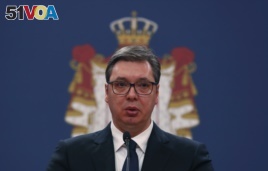05 April 2020
On the streets of Belgrade, heavily armed Serbian soldiers walk the streets. The army guards a large complex of buildings that have been turned into a temporary hospital. The buildings are lined with beds ready for possible COVID-19 patients.
The country's president, Aleksandar Vucic, has warned citizens that Belgrade will not have enough space to bury the dead if people ignore his lockdown orders.
Vucic announced a state of emergency on March 15. Serbia has put into effect some of the strongest measures in Europe to stop the spread of the new coronavirus.

In this March 15, 2020, photo, Serbian President Aleksandar Vucic speaks during a news conference in Belgrade, Serbia. Since declaring nationwide state of emergency Vucic has suspended parliament, giving him widespread powers.
Parliament is suspended under the orders. Serbian borders are closed and a 12-hour curfew is in effect. The measures also bar people over the age of 65 from leaving their homes. Critics say Vucic's actions are unconstitutional.
Rodoljub Sabic is Serbia's former Commissioner for Information of Public Importance and Personal Data Protection. He said the president of Serbia holds only ceremonial responsibilities under the country's constitution. But, he said Vucic has taken total power of decision-making during the crisis.
He said, "He issues orders which are automatically accepted by the government. No checks and balances."
Several European leaders are ordering similarly strong measures on the public. These include unrestricted government observation of cell phone use and long jail sentences for those who violate lockdown orders.
Ingibjorg Sólrún Gísladóttir leads the democracy and human rights agency of the Organization for Security and Cooperation in Europe. She said she understands the need for fast action to protect the public from COVID-19. But she said the newly announced emergency orders should include time limits and parliamentary control.
"A state of emergency, whether it is declared and for whatever reason, must be proportionate to its aim," she said.
In times of national emergency, countries often take action that restricts civil liberties. Such action can include spying on citizens, ordering curfews, banning travel, and limiting rights of free expression. China ordered lockdowns of whole cities earlier this year to stop the spread of the virus. India ordered a countrywide lockdown.
Amnesty International researcher Massimo Moratti said states of emergency are permitted under international human rights law. But he warned that they should not become a "new normal."
He said emergency orders should remain in effect only as long as the danger remains.
In the European Union member-country of Hungary Monday, parliament passed a number of severe new laws. One permits the government unrestricted power to order laws during the state of emergency. Another sets prison terms of up to five years for people who spread misinformation and up to eight years for people who violate orders that restrict movement.
Critics say the Hungarian action creates the possibility for an unending state of emergency. They say Prime Minister Viktor Orban and his government will be able to control the press and restrict human rights without any supervision.
Tanja Fajon, a member of the European Parliament, was among the critics. She said Orban had "abused coronavirus as an excuse to kill democracy and media freedom."
Other governments have also taken extreme measures.
In Israel, Benjamin Netanyahu's government passed several emergency measures, including laws that expand the government's right to spy on people and to slow judicial activity. This resulted in a postponement of Netanyahu's own trial on corruption charges.
In Russia, law enforcement agents are repressing COVID-19 discussion on social media. They are also acting against media that criticize the government's actions connected to the crisis.
Almost 800 coronavirus infections and 16 deaths have been reported in Serbia, says Johns Hopkins University in Maryland. However, testing has been extremely limited and experts think many more COVID-19 cases exist.
Pictures from inside the huge temporary medical center in Belgrade have caused public fear. Many say the place looks like a detention camp.
The Serbian president said that this is a good thing: if people are frightened of the image, they should obey orders to stay home.
I'm Jonathan Evans.
The Associated Press reported this story. Susan Shand adapted it for Learning English. Caty Weaver was the editor.
________________________________________________________________
Words in This Story
lockdown - n. the total shutdown of a community
automatically– adj. something that happens without being controlled by a person
proportionate– adj.a size or number directly related to something else
judicial - adj. having to do with the courts or the legal system